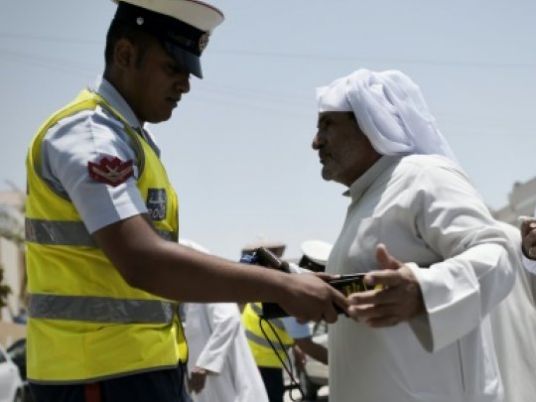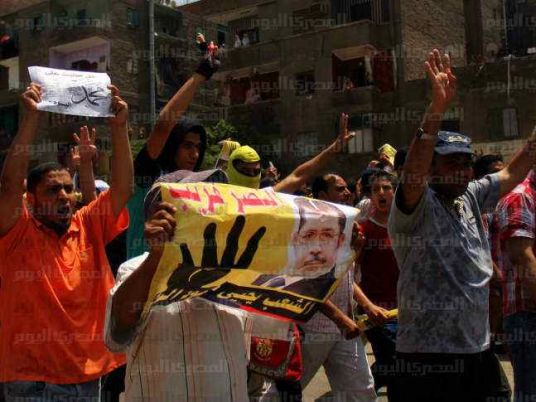It is important to consider the story of Qursaya as the second anniversary of the revolution approaches. It’s a story of violence and imprisonment, of the powerful targeting the marginalized, of ruling interests trampling over the rule of law, and of an ongoing struggle against a state that regards its poorest citizens as a bothersome nuisance impeding plans for progress.
The island of Qursaya is a rarity in the crowded cacophony of Cairo: an undeveloped stretch of lush agricultural land near the west bank of the Nile in Giza. With no bridge tying it to the mainland, Qursaya is only accessible by boat or a manually operated chain ferry. The island is home to a community of roughly 4,000 farmers and 1,000 fishermen who have managed to stake out a rural life in one of the world’s most congested cities.
Generations of families have grown up on the island. They built houses, cultivated the land and fished the surrounding waters. They set up basic infrastructure, bringing in electricity and water, paid for alongside taxes for real estate and farmland. While the government never granted the residents ownership rights, to them, Qursaya is home.
Yet the community was sitting atop prime real estate in the heart of Cairo. In 2007, the government issued an eviction order and ordered that farmers’ land contracts not be renewed, claiming the island was state property, in what was seen as a prelude to selling it to wealthy developers.
The military stormed the island with troops and bulldozers to try to forcibly evict the residents. They refused to leave and instead took their case to court and won. The government challenged the ruling, but was shot down in 2010 when Egypt’s highest administrative court ordered the government to halt any eviction plans.
Nevertheless, the army maintained a small camp on the island, where it grows crops and sells them back to the residents. After the revolution, the army presence thinned out until two months ago, when it decided to strike with brutal force.
On 16 November, an army colonel backed by 500 soldiers visited Qursaya after residents decided to take back some of the land left vacant by the low military presence. The colonel met with residents, who presented copies of court documents affirming their right to work and live there. He left without requesting that the residents leave or providing any warning of the impending attack.
After two days, the army stormed Qursaya in a brutal dawn raid. Chanting “God is great,” soldiers descended on the island from boats. They attacked people with batons, electrocuted them with cattle prods and fired at them with birdshot and live ammunition. They stormed houses and set fire to several fishermen’s boats and farmers’ huts.
Fleeing the violence, many residents jumped into the Nile, where soldiers continued to fire at them. Mohamed Abdel Mawgoud, a 20-year-old fisherman, was shot twice and died minutes later.
The raid ended with the army indiscriminately arresting 25 residents, ranging in age from 18 to 50, and hauling them before a military prosecutor who charged them with assaulting the military and seizing land owned by the Armed Forces. They have been behind bars for the past two months.
The next day, army spokesperson Colonel Ahmed Mohamed Ali responded to critics with a statement on his official Facebook page in which he claimed the land was in fact owned by the Armed Forces, pointing to a document drawn up by the military itself to register the land in its name in July 2010, a full five months after the second court ruling affirming the residents’ right to live and work there. The statement also made the dubious claim that the land was vital to the army’s mission to secure the capital.
Despite the brutality of the raid, the story quickly faded from public view, overshadowed by Israel’s assault on Gaza, and followed immediately by President Mohamed Morsy’s contentious decree, which allowed the Muslim Brotherhood and its allies to ram through a controversial Constitution.
One of the biggest outrages of the new Constitution is that it allows for cases like the Qursaya military trial to continue. An earlier draft of the constitution contained language that strictly prohibited trying civilians before military courts. Yet assembly members removed this language “after military justice officials formally objected,” according to Human Rights Watch.
Article 198 of the Constitution leaves intact the military’s discretion to try civilians in military courts in a significant step backward for human rights in Egypt. Previous constitutions did not mention military trials of civilians, allowing lawyers to argue that the practice itself was unconstitutional. Now, Article 198 makes referring civilians to military trial constitutionally acceptable.
The Muslim Brotherhood’s capitulation is all the more troubling given their long history of being among the primary victims of military trials during the Hosni Mubarak era. In their ascent from a banned opposition group to political power, an explanation can be found. Those with access to power are not threatened by the most abusive practices of the state, like military trials. It is society’s most marginalized who are always targeted, and the Brotherhood has stepped forcefully out of the margins only to sacrifice those left behind.
A military court is scheduled to hand down a verdict on the Qursaya detainees on 28 January, a date that marks the second anniversary of the “Friday of Anger,” when hundreds of thousands of Egyptians took to the streets in what was arguably the most decisive day yet in Egypt’s revolution. For the people of Qursaya and those who share in their struggle, we need many more like it.
Sharif Abdel Kouddous is a correspondent for “Democracy Now!” and a fellow at The Nation Institute. This article was originally published in Egypt Independent's weekly print edition.




